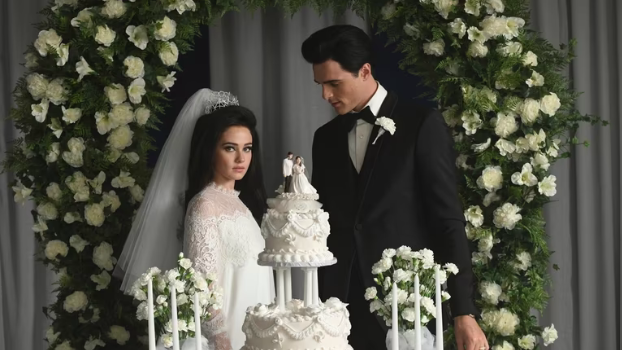Priscilla and Elvis in Coppola’s depiction of their wedding day. Photo courtesy of Observer.
EMMA MCLEAN | STAFF REPORTER | emclean@butler.edu
“Film Fanatics” focuses on the latest and greatest cinema has to offer. Ranging from the newest movies in theaters to familiar favorites, enjoy thoughtful reviews that inspire further reflection or several rewatches. Read on to discover a new favorite film.
Nearly a year after the triumphant release of “Elvis”, the Presley story is being retold through Priscilla Presley’s formidable perspective. Sofia Coppola’s newest film, “Priscilla”, follows Elvis’s wife as she grapples with their unorthodox relationship and newfound stardom. The film has ignited enthusiasm and controversy alike, with some believing it unjustifiably depicts Elvis Presley as a villain. The Elvis Estate has openly expressed its distaste for the film and Coppola herself. Coppola’s response is simple: “I’m not making it for them.”
The movie opens in 1959 on a military post in West Germany, where 14-year-old Priscilla Beaulieu — portrayed by Cailee Spaeny — lives while her father serves as an Air Force officer. There, she meets Elvis — portrayed by Jacob Elordi — and they almost instantly begin a strange sort of unlabeled romantic relationship. Priscilla allows the parties at Elvis’s house to overshadow all other areas of her life as she becomes engrossed in the youthful exhilaration of dating him. This would be an incredibly authentic portrait of naive teenage love — except one of them is 24.
Instead of emphasizing the problematic grounds of the relationship, Coppola merely presents it to the audience and allows them to interpret it freely. The film is not an assault on Elvis’s character; rather, it is an exploration of the way his life influenced Priscilla’s, which was completely. Within the first half of the film, the audience watches her struggle with her life in West Germany, move into the Graceland estate and graduate high school. Throughout this period of adolescence, she constantly longs to be beside Elvis, which she seldom is. Instead, she peers into his life through magazines, occasional phone calls and even more infrequent visits.
If Baz Luhrmann’s “Elvis” is a depiction of the superstar’s loud, chaotic and always evolving life, “Priscilla” is a quiet portrait of the girl watching that life from afar. Coppola relishes in silent scenes and long shots of Priscilla alone. When Elvis is present, the intensity of the film is amplified. The film looks at the various kinds of cruelty Priscilla endures at the hands of Elvis, such as instances of intentional violence, encouragement of drug use and emotional manipulation. It does this with a focus on his impact on Priscilla rather than an exaggeration or over-vilification of Elvis. Their relationship is depicted with great complexity and attention to detail, which could be attributed to the film following Priscilla Presley’s account in her book “Elvis and Me”, as well as Priscilla Presley’s own role as executive producer of the film.
After years of abuse and isolation, Priscilla begins to rebuild her life without Elvis’s influence over what she does, wears or thinks. Her fight for autonomy is won when she leaves Elvis in a brief and quiet scene that emphasizes just how broken they both are. With two hands on the steering wheel, Priscilla drives herself out of the gates of Graceland.
“Priscilla” shows what “Elvis” left out in a sophisticated and bold portrayal of their relationship. Coppola approaches the film with sensitivity and bravery, allowing Priscilla’s suffering to exist without needing to justify Elvis’s behavior. Spaeny’s portrayal of Priscilla is certainly a highlight of the film, earning her the award of Best Actress at the Venice Film Festival. Due to its controversial nature, Coppola’s “Priscilla” invites a wide variety of reactions. The only way to decide for one’s self is to join Priscilla in the quiet suffering and deceptive utopia that is Graceland.
Coppola’s “Priscilla” is currently available to see at theaters nationwide.



